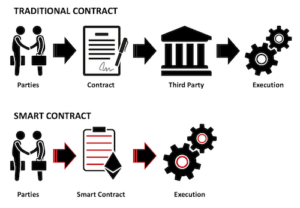BD Help Zone
Your go-to source for insightful news and information.
Fairness in Smart Contracts: A Balancing Act Between Code and Ethics
Explore the intriguing intersection of code and ethics in smart contracts. Discover how fairness shapes the future of blockchain technology!
Understanding the Ethical Implications of Smart Contracts
Smart contracts represent a revolutionary shift in how agreements are executed in the digital age. Built on blockchain technology, these self-executing contracts automatically enforce and execute terms without the need for intermediaries. However, with this innovation comes a myriad of ethical implications that must be carefully considered. For instance, issues related to privacy arise as smart contracts operate in a public ledger, potentially exposing sensitive information. Additionally, the lack of regulatory oversight can lead to situations where parties may exploit the technology, bypassing traditional ethical standards that protect consumers and businesses alike.
Furthermore, the immutable nature of blockchain raises questions about accountability and fairness. Once a smart contract is deployed, it cannot be easily modified or revoked, which can lead to unintended consequences if the initial code contains flaws or if circumstances change. This raises a critical ethical dilemma: how do we ensure that smart contracts are written with rigorous standards and inclusive considerations that prevent harm to all parties involved? As we navigate this new landscape, it is essential for developers, regulators, and users to collaboratively establish ethical frameworks that promote responsible use of smart contracts while safeguarding against potential abuses.

Counter-Strike is a popular first-person shooter game that has captivated gamers since its release. Players often engage in team-based gameplay, working strategically to complete objectives such as bomb defusal or hostage rescue. For those looking to enhance their gaming experience, you might want to consider using a bc.game promo code to get some exciting bonuses.
How to Ensure Fairness in Smart Contract Design
Ensuring fairness in smart contract design is crucial for maintaining trust and integrity in blockchain applications. First, it's essential to incorporate transparent governance mechanisms. Utilizing decentralized decision-making processes allows all stakeholders to have a say in the contract's operation and updates. Additionally, implementing open-source audits invites third-party developers and security experts to review the code, further enhancing its credibility. Lastly, clearly documenting all aspects of the contract helps clarify intentions and potential outcomes, fostering a better understanding among users.
Another vital aspect of achieving fairness in smart contract design is to focus on the economic incentives structured within the contract. By designing incentive models that align the interests of all parties involved, you ensure that no participant can unfairly benefit at the expense of others. This can be done by implementing penalties for malicious behavior and rewards for positive contributions. Furthermore, conducting extensive testing and simulations can help identify and mitigate potential exploitation scenarios before deployment, ultimately leading to a more equitable and robust smart contract.
What Role Do Developers Play in the Ethics of Smart Contracts?
In the rapidly evolving world of blockchain technology, developers play a critical role in shaping the ethical landscape of smart contracts. As the creators of these self-executing agreements, they must ensure that the code is not only functional but also fair and trustworthy. This involves a deep understanding of the potential ramifications of their code, as even minor errors or biases can lead to significant consequences for users. Developers must prioritize transparency and inclusivity in the coding process, establishing clear guidelines and best practices to avoid unintended exploitation or discrimination.
Moreover, the ethical responsibilities of developers extend beyond just coding practices; they also involve fostering a culture of accountability within the blockchain community. This can include engaging with stakeholders to solicit feedback, participating in code audits, and promoting ongoing education about the implications of smart contracts. As custodians of this technology, developers have the power to influence public perception and adoption, making it imperative for them to advocate for ethical standards and practices that enhance trust and security in the decentralized landscape of smart contracts.